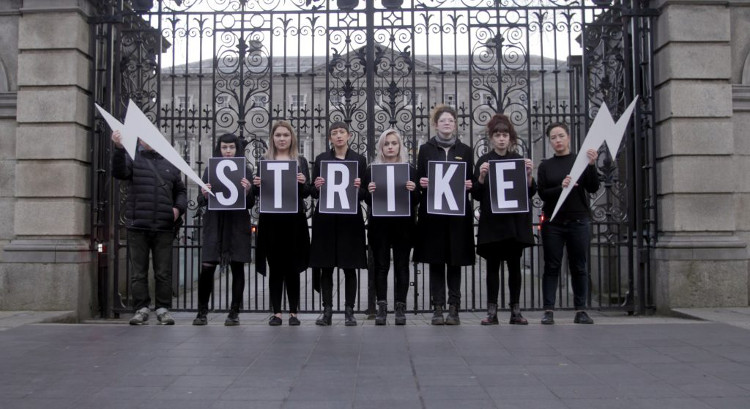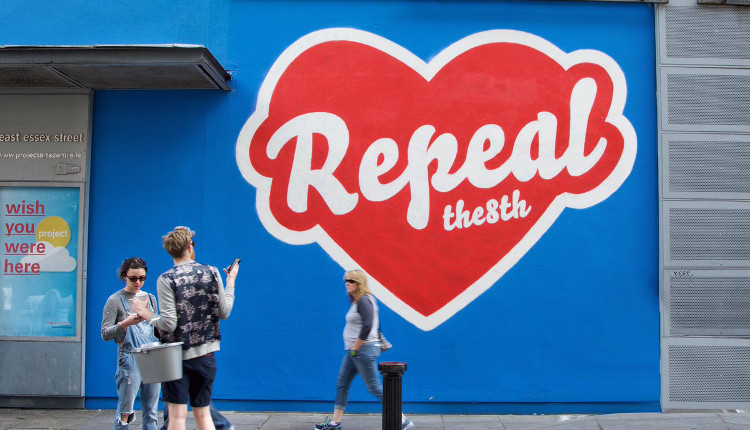Tipping Point | Will 2018 Finally Be The Year For Repeal?
I’m writing this while still giddy from the news that the Joint Committee on the 8th Amendment voted unequivocally to put a repeal referendum to the nation. The 8th amendment is now 34 years old. I just turned 33. It was voted in while I was just a twinkle in my mother’s eye.
When I was growing up in the 80s and 90s in Ireland, declaring you were pro-choice could potentially lose you friends and win you enemies. I went to school with people who wore pins of tiny feet on their jumpers because that was the size of the feet of a 12 week old fetus. I remember regularly walking past anti-choice campaign stalls on Patrick Street with graphic photos of dismembered fetuses. Ireland in 2017 is radically different. Now Irish people walk the streets proudly in Repeal jumpers, wear Repeal pendants and badges and our streets are full of Repeal art.
Our time has come
Following the 1983 referendum that gave us the 8th amendment, the idea of a more liberal abortion regime in Ireland seemed like an impossible dream. Shipping thousands of pregnant women to England was the quintessential Irish solution to an Irish problem. Everyone knew it was happening but as long as no one mentioned it and those who went abroad remained silent and ashamed then we could all carry on proudly as the Vatican’s stalwarts in Europe.
Except that in 2012 Savita Halappanavar died from sepsis, at Galway University Hospital. Her death was provoked by the miscarriage of her baby at 17 weeks. A termination, a routine obstetric procedure that is standard medical practice for early miscarriages in most parts of the world, would have saved her life. Not in Ireland, however. No, we are a Catholic Country, Savita was told. The fetus, though not viable, still had a heartbeat and Savita was left to agonise for three days before sepsis eventually overcame her. She died having repeatedly asked for, and been denied, a termination for her doomed pregnancy.
Ireland was not prepared for the shock of Savita’s death. What about our world class maternity care? What about our equal constitutional protection for the life of the mother and the life of the unborn child? We should have been prepared. Savita’s death was the inevitable result of a country which, to all intents and purposes, does put the life and well being of the fetus first despite those who would assert that we #loveboth. A country where medical practice is permeated by Catholic dogma and restrained by constitutional impediments and fear of criminal repercussions.

We have Savita’s husband, Praveen, to thank for going public on the treatment she received and the measures that were not taken to save her life over three days she agonised in hospital. Perhaps it took a migrant family, who could not understand how Savita was denied treatment she would have received without hesitation in her home country of India, to finally uncover the barbarity at the heart of Ireland’s treatment of pregnant people.
The tipping point
Savita’s death and Praveen’s bravery in speaking out, was the tipping point, that brought home the life and death urgency for changing our laws. It should never have taken such an unnecessary death to get us to this point.
Since 2012 the reproductive justice movement in Ireland has been growing slowly but surely in an unstoppable momentum that has been bolstered by Irish people’s disillusionment with the Catholic Church following multiple reports and investigations into the systematic and horrific abuse Irish people have received at the hands of the Church. Crucially, new generations young Irish women and men have begun to question the Church’s near century-long stranglehold on Ireland’s politics, education, healthcare, and social policy like no previous generation.
Nevertheless, successive governments have done everything possible to avoid addressing the issue. First it was the long battle to legislate for the X-Case, which was already law according to precedent. That produced the Protection of Life During Pregnancy Act, which, while legislating the X Case, also imposes a 14 year prison sentence for procuring an abortion. Moreover, we have seen cases recently that if you are suicidal as a result of your pregnancy you are more likely to be sectioned than to receive the abortion you are legally entitled to. The law has been criticised by international Human Rights bodies as imposing impractical conditions to obtaining a legal abortion and as contrary to the dignity and rights of individuals.
Speaking out
Legislating for the X Case, however, was never going to be enough. An estimated 12 pregnant people a day still leave Ireland to access abortion abroad and three more order pills online for a multiplicity and complexity of reasons that could never be fully accounted for through legislation.
The movement Termination for Medical Reasons (TFMR) emerged as brave parents began to share their heartbreaking stories of having to travel to seek essential medical care denied to them at home. They have spoken about the lack of options and the lack of compassion, the shame and trauma they have experienced in having to seek these health services abroad, or of bringing the remains of their babies back in cooler bags or leaving them to be buried in England. They are often attacked and abused or branded as heartless liars and murderers by those who claim to be pro-life and claim to #loveboth.

Then prominent Irish women began to speak out about their very much “ordinary” and necessary abortions. Roisín Ingle, Tara Flynn, Lucy Watmough and others faced the shame and stigma still hangs over this most taboo of topics and spoke about why they decided to abort. Hundreds more followed sharing their stories, often anonymously, on social media, in newspapers, with the Repeal Project, in the Not at Home project, in Una Mullally’s forthcoming anthology and across many other platforms.
While the Repeal debate often centres on abortion many other brave people have been speaking out about how the 8th amendment has impacted their prenatal and obstetric care, often removing the right to informed consent, impacting the autonomy and bodily integrity of people during pregnancy and birth. Medical professionals have spoken out about how the 8th Amendment has a “chilling effect” when it comes to making medical decisions around obstetric care, those decisions unduly guided by law rather than medical practice or the best interests of the pregnant person.
Years of shame and silence were very convenient for the anti-choice side, they could claim to be pro-life without engaging with the uncomfortable realities of why people need or choose to terminate a pregnancy. Their lack of compassion, or indeed, their attacks against those who have spoken out only serves to demonstrate that their real concern is not for “life” but for retaining Ireland’s rigid control over female sexuality. They rely on fear-mongering, misinformation and bullying, meanwhile the pro-choice side is constantly labelled as ‘extreme’ and subjected to tone policing across the national media.
Onwards and upwards
2017 has been an unprecedented year for reproductive justice in Ireland. The Citizens Assembly, contrary to all expectation, recommended unrestricted access to abortion in Ireland up to 12 weeks, going far beyond a simple repeal of the 8th amendment. The 8th Committee has, more or less, mirrored those recommendations, proving that once citizens have access to impartial and objective information from medical and legal experts, those who accompany and support Irish people in their reproductive choices and those who have been impacted by Ireland’s abortion ban, the inevitable result is to recommend the liberalisation of our laws.
In the meantime there have been national and international marches, strikes, concerts, petitions, plays, artistic interventions, books, twitter campaigns and legal challenges in support of Repeal. People have taken to the streets in record numbers. Grassroots Repeal groups have sprung up across the country. International human rights bodies have consistently called for more a more liberal abortion regime, declaring that the current system has led to the ‘cruel and inhuman’ treatment of our citizens.
On the wrong side of history
All but a few brave members of successive governments have refused to touch the abortion question because of the fear of losing the still loud, but aging, anti-choice vote.

For every Brid Smith, Ruth Coppinger or Clare Daly there is a Mattie McGrath or Ronan Mullen, consistently disrupting the 8th committee sittings and hurling abuse and misogynistic insults at witnesses or committee members. We have had to put up with middle-aged to elderly, male, political leaders and their ‘opinions‘ on why abortion should be denied to women even in cases of rape or incest.
A meme has been circulating in Ireland for quite some time now that the Catholic church has been against numerous progressive initiatives since the formation of the Irish Republic. From as early as Noel Browne’s attempt to provide state, and not church led health care, to the legalization of contraception, divorce and even the availability of tampons, the Church has always opposed progress and our right to bodily autonomy.
One of history’s true ironies is that loyalists who opposed Irish independence used the slogan ‘Home Rule is Rome Rule.” Nevertheless, as a Republic, that is essentially what we got. For this generation of Irish people enough is enough. We want the church out of our classrooms, out of our hospitals and out of our wombs. We are not handmaidens, we are not vessels, we are not meant to ‘bear the curse of eve’. We deserve more than coat hangers, knitting needles, bleach, scalding baths, throwing ourselves down the stairs, buying pills online or making the last minute journey to England. We deserve the repeal of the 8th Amendment, let 2018 be the year.
